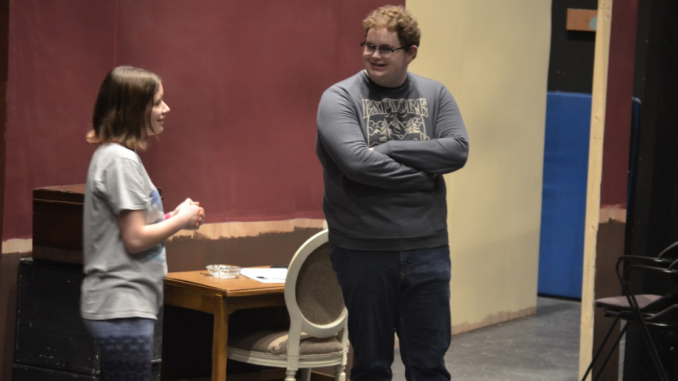
Truman State University’s theatre department is debuting new productions and expanding its reach this semester to new audiences.
The department is producing “The Mousetrap” by Agatha Christie and the horror comedy musical “Little Shop of Horrors” by Howard Ashman this season.
“The Mousetrap” will be performed March 1-3 at 7:30 p.m. and March 4 at 2 p.m in the Black Box Theatre, Ophelia Parrish Building. Tickets will be $8. The show, written by Agatha Christie, is a murder mystery taking place in London, England. The show will be staged in the Black Box Theatre, a venue that has been unused so far this theatre season, said Lydia Lamb.
Lamb, who plays the role of Mrs. Boyle said, “Typically we do shows in the Severns Theatre which has a bigger stage. But [in] this show, since the Black Box is condensed, we have less seating … the audience surrounds us on three sides.”
Anyone who likes mysteries or dramas or thrillers, especially anything with twists and turns, will love this show, Lamb said.
Elizabeth Harness, who plays the role of Mollie Ralston, said she was excited to be a part of the cast for “The Mousetrap.”
“You get a lot of the same people working together on shows over and over again,” Harness said. “We’re a pretty tight-knit group.”
“Little Shop of Horrors” will run April 19-22 and April 28-29 at 7:30 p.m. in the James G. Severns Theatre, Ophelia Parrish Building. Tickets will also be $8. The horror comedy musical takes place in a flower shop on Skid Row, which is home for an increasingly bloodthirsty plant.
A musical production requires having a musical director who is in charge of the singing and the band, said Cat Gleason, assistant professor of theatre and director of “Little Shop of Horrors.”
Gleason said there is an additional layer of needed talent when producing a musical rather than a play, including a pit band of musicians, more choreography, special sound design and engineering.
“And puppets!” said Gleason. Most productions rent their puppets, Gleason said, but Truman’s production will make them from scratch.
“I think people are going to love all the jokes and the music,” Gleason said. “You’re going to walk out humming these songs. You can’t get them out of your head.”
Lamb said the Truman theatre department also puts on a one-act student showcase at the end of the semester, in which students in the directing class will direct their play.
“Student directors pick the scripts. They cast the show, they work with student designers,” Harness said. “It’s all student-designed, student-run, student-directed and student-acted.”
Lamb said she recommends the student-led one-act shows for casual viewers who don’t want to commit to a full-length show or purchase the $8 ticket.
In addition to these upcoming productions, the department is evolving because of new staff and new ideas. A significant number of faculty changes mean the department looks different than it did last season, Harness said.
Gleason, who started fall 2022 as a full-time faculty member, said “We’re going to have a fairly new theatre department, and I think that’s so thrilling. I want to build on and embrace what Truman Theatre has been. I’m not interested in throwing things out, but I also see it as an opportunity… [to] start thinking about how we make our spaces and communities healthier and work for each other.”
The way the department chooses plays and productions will be different, Gleason said. The season selection process will now include two students on the selection committee.
“One of the other things that’s really important to us here at Truman theatre is the safety and well-being of our actors and student artists,” said Gleason. The department introduced new policies and protocols to improve student communication, safety and well-being.
In the past, the actor’s deputy was an anonymous person the actors could go to with concerns regarding the stage manager and director. It was then the deputy’s job to take the concerns to the stage manager and director. Now, with new policies in place, the actor’s deputy is a more visible role.
“Everyone knows who they are, and they have a lot more training…[which] has helped to open communication between actors, directors and designers,” Harness said.
This new communication allows actors to build confidence in advocating for themselves and helps directors to be more receptive to the actors’ concerns, ideas and creative visions, Harness said.
To buy a ticket for any production during the spring 2023 season of Truman theatre, visit boxoffice.truman.edu. Those with questions, concerns or accommodation needs can also contact boxoffice@truman.edu or 660-785-4515.
